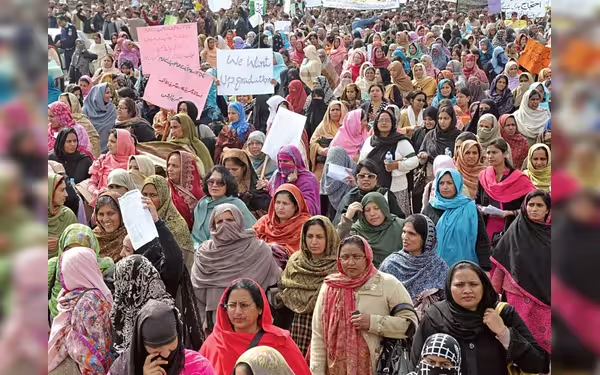Thursday, July 4, 2024 06:06 PM
Teachers' Unions Lead Protest Against School Privatisation in Punjab
- Teachers in Punjab protest government's decision to transfer schools to NGOs
- Concerns raised about potential commercialisation of education and impact on out-of-school children
- Demand for immediate cancellation of privatisation plan to safeguard public education
 Image Credits: tribune_pk
Image Credits: tribune_pkTeachers' organisations in Punjab protest against government's move to transfer schools to NGOs, raising concerns about potential commercialisation of education and impact on out-of-school children. The demand for immediate cancellation of the privatisation plan reflects the importance of safeguarding public education in Punjab.
A province-wide protest movement has been initiated by a coalition of teachers' organisations in Punjab, Pakistan, against the government's decision to transfer 13,000 government schools to non-government organisations (NGOs). The teachers' unions, including the Punjab Teachers Union, Punjab Educators Association, and SS Teachers Association, have come together to oppose what they perceive as an attempt to privatise public education.
The protests, symbolised by teachers wearing black bands on their arms, aim to raise awareness about the potential consequences of this move. The education department's call for applications from NGOs, individuals, and educated youth to take over the schools by June 5, with a target of completing the privatisation process by June 30, has raised concerns among union leaders.
The teachers' organisations fear that privatising schools could lead to the commercialisation of educational assets, potentially resulting in higher fees for students and exacerbating the issue of out-of-school children. They argue that this plan may significantly impact the education system, potentially increasing the number of out-of-school children from 205 million to 300 million.
Moreover, there are concerns about the downsizing of teaching and non-teaching staff, as the government plans to retain only 10,000 schools under its control. Despite assurances from political leaders to halt the privatisation process, the government has proceeded with its decision, prompting strong criticism from the teachers' organisations.
The ongoing protests highlight the deep concerns among teachers about the future of public education in Punjab. The demand for the immediate cancellation of the privatisation plan underscores the importance of safeguarding the welfare of teachers and students, while upholding every child's universal right to education. The outcome of this movement will not only shape the educational landscape in Punjab but also set a precedent for the broader conversation on public versus private involvement in education.













